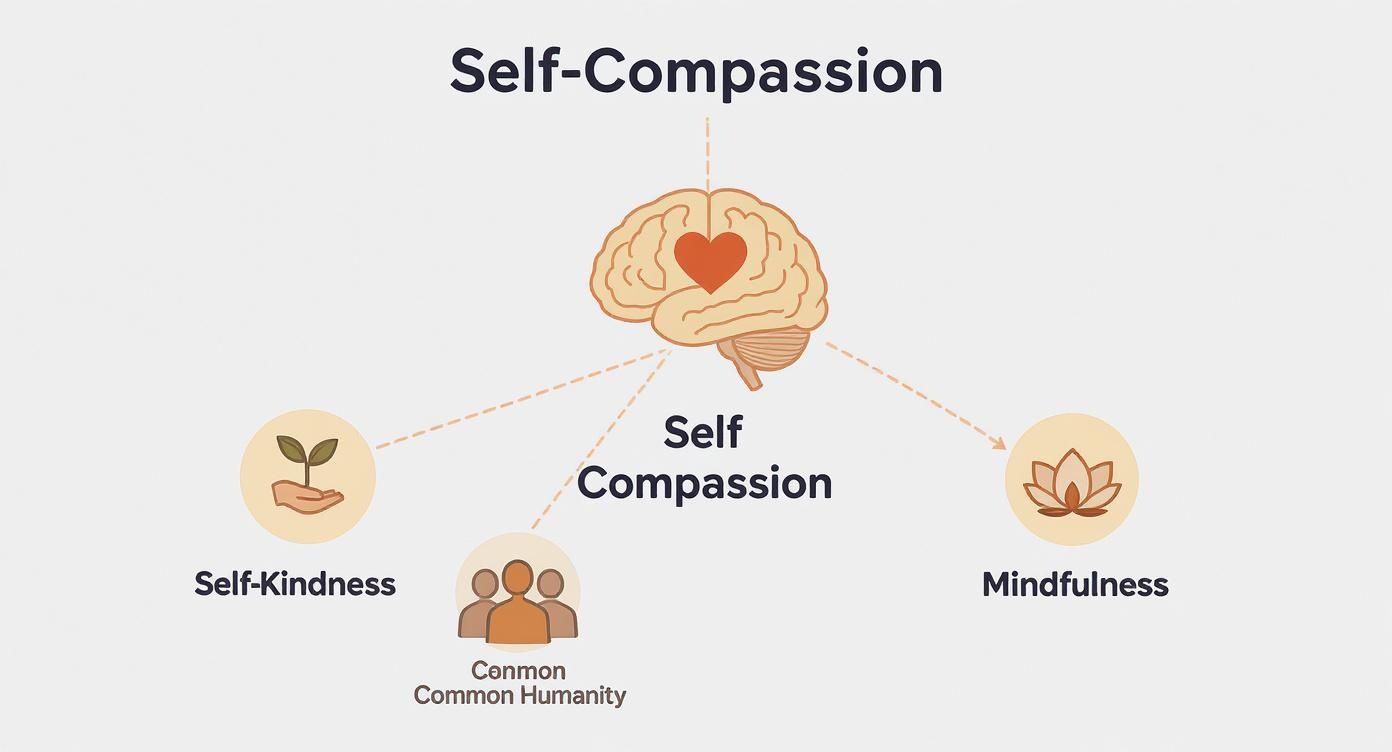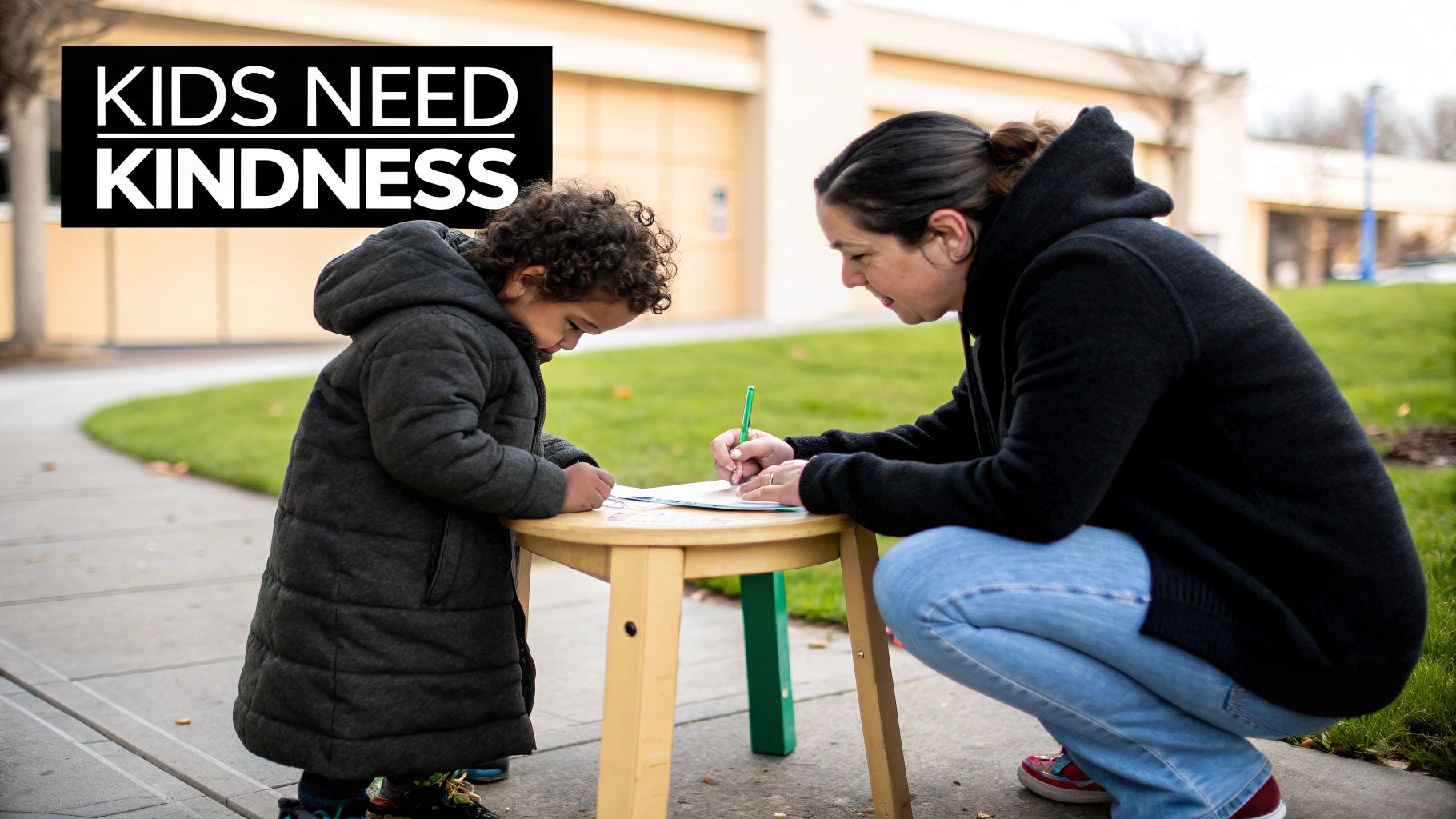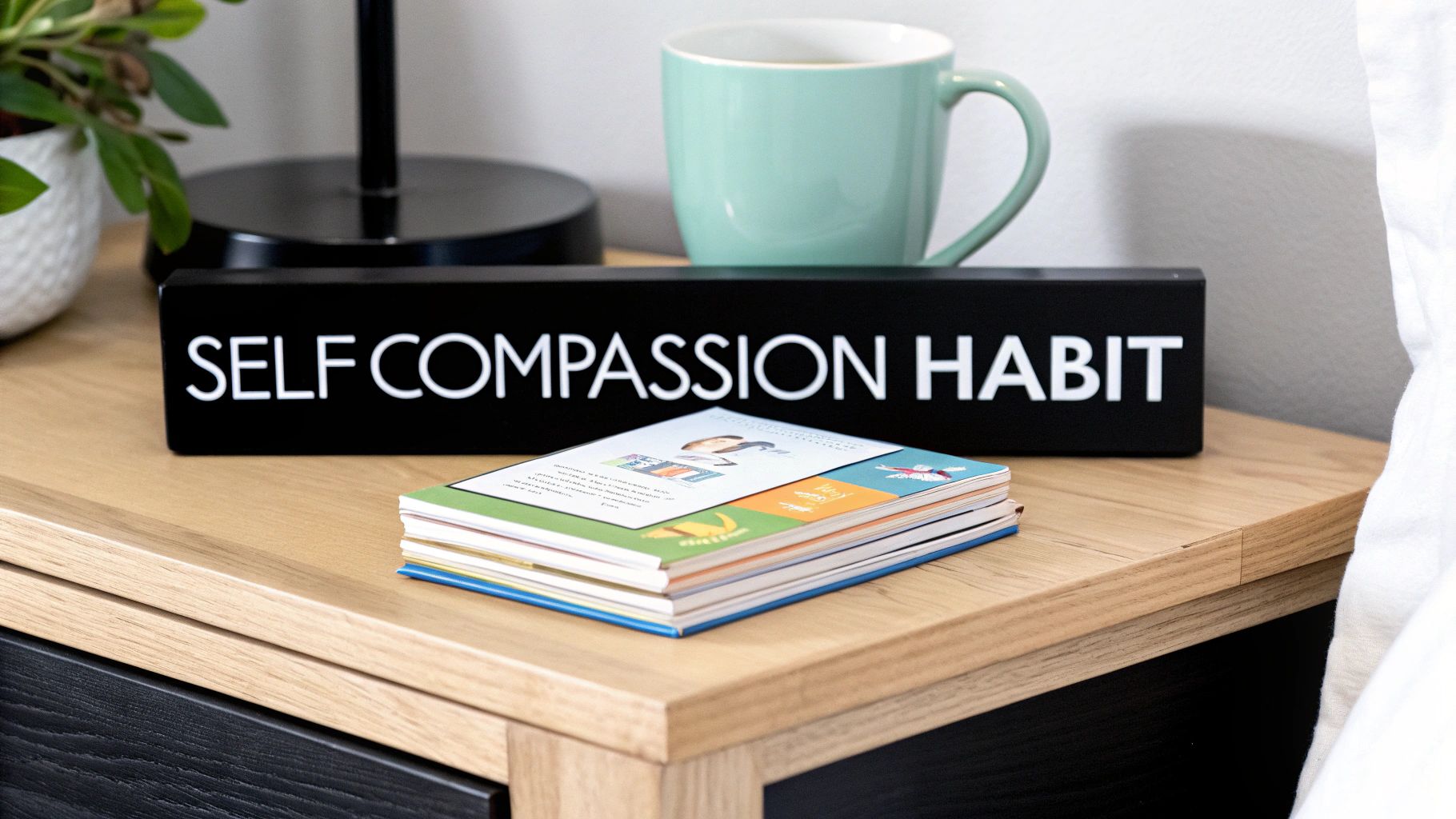
What is self-compassion: a practical guide to mental wellness
Share
So, what is self-compassion, really?
At its heart, it’s about treating yourself with the exact same kindness, care, and support you’d instinctively offer a good friend who’s having a tough time. It’s not about letting yourself off the hook or wallowing in self-pity. Far from it. It’s a powerful, practical way to build genuine emotional strength.
The Foundations of Self-Compassion
Self-compassion isn't just a nice idea or a fleeting feeling. It’s an active practice, something you build, resting on three core pillars that all work together. Getting to grips with these pillars demystifies the whole concept and shows why it's such a vital skill for navigating life's ups and downs, especially for young people today. With the constant pressures from school and social media, this inner resource is more important than ever.
This visual map is a great way to see how it all fits together, breaking down self-compassion into its three core branches: self-kindness, common humanity, and mindfulness.

As you can see, self-compassion is an active process. It’s a blend of gentle acceptance, mindful awareness, and a real sense of connection to others.
A Closer Look at the Three Pillars
Let’s dive a bit deeper into these components to really understand how they show up in everyday life. For a quick overview, this table breaks it all down.
The Three Pillars of Self-Compassion
| Pillar | What It Means for You | A Real-Life Example |
|---|---|---|
| Self-Kindness | Being warm and understanding with yourself when you're suffering, failing, or feeling inadequate, rather than being harshly critical. | A child gets a bad mark on a test. Instead of thinking, "I'm so stupid," they might think, "That was a tough test. I did my best, and I can ask for help next time." |
| Common Humanity | Recognising that suffering and personal feelings of inadequacy are part of the shared human experience – something we all go through. | A teenager feels left out by their friends. Instead of spiralling into isolation, they remember that loneliness is a universal feeling that everyone experiences at some point. |
| Mindfulness | Taking a balanced approach to your negative emotions so that feelings are neither suppressed nor exaggerated. | A parent feels completely overwhelmed. They mindfully acknowledge, "I am feeling stressed right now," without letting that feeling take over their entire day. |
These pillars aren't just abstract concepts; they are skills you can actively develop. Here's how to think about them in more detail:
-
Self-Kindness vs. Self-Judgement: This is about switching out that harsh inner critic for a more gentle, understanding voice. When we mess up, the default for many of us is to beat ourselves up. Self-kindness is the intentional act of being supportive instead.
-
Common Humanity vs. Isolation: This pillar reminds us that we're not alone in our struggles. It's so easy to feel isolated when things go wrong, as if you're the only one who feels this way. Common humanity is the realisation that making mistakes and feeling pain is part of what connects us all as human beings.
-
Mindfulness vs. Over-Identification: This is about observing our difficult thoughts and feelings without getting totally swept away by them. It's the practice of noticing, "Ah, there's that feeling of anxiety again," rather than becoming "an anxious person." It gives us the space to respond thoughtfully instead of just reacting.
Disclaimer: This article provides guidance and information, but it is not a substitute for professional medical advice. I am not a mental health professional. If you have serious concerns about your or your child's mental health, please consult your GP or a qualified healthcare professional.
Developing these skills is fundamental for mental wellbeing. Building a compassionate inner voice is also a key aspect of healing and resilience, an idea we explore more in our guide on what is trauma-informed care. By learning to offer ourselves warmth and understanding, we build a foundation for a healthier, more resilient emotional life.
The Science of Being Kind to Yourself

Understanding what self-compassion is goes way beyond just 'being nice' to yourself. It's actually a powerful tool with real, science-backed benefits for both your brain and your body. When you practise being kind to yourself, especially when things get tough, you're actively rewiring how your brain responds to stress. It’s not just a fluffy concept; it's a practical way to build a much more resilient mindset.
Think of it as turning down the volume on your internal alarm system. When we face criticism or feel like we've failed, our brains can easily slip into 'fight-or-flight' mode. This triggers a flood of the stress hormone, cortisol. Self-compassion does the opposite. It activates the brain’s own soothing systems, helping us feel safe and secure instead.
This simple physiological shift can have a massive impact on our mental wellbeing. It gives us the tools to handle high-pressure situations far more effectively, whether you're a parent juggling family life, a student facing exams, or a professional dealing with the daily grind at work.
Building Resilience Through Self-Kindness
The link between self-compassion and resilience isn’t just a nice idea; it's something researchers have seen time and time again. A resilient mind is one that can bounce back from setbacks, and being kind to yourself is what builds that strong emotional foundation.
When you treat yourself with kindness after making a mistake, you create a safe internal space to own up to it without getting bogged down by shame. This is huge. It means you can actually learn from what happened and move forward stronger, rather than getting stuck in a negative loop of self-criticism.
This is especially vital in high-stress environments. For instance, a 2021 study looking at UK nursing students found a powerful connection between self-compassion and key traits like resilience, mental wellbeing, and motivation. In fact, the research showed resilience and mental wellbeing were the biggest predictors of self-compassion. You can read more about their findings on self-compassion.org.
"Practising self-compassion is like building an emotional support structure inside yourself. It doesn't prevent storms, but it ensures you have a safe place to shelter when they arrive, allowing you to recover and rebuild faster."
This internal support system is crucial for long-term mental health. The psychological benefits ripple out into all areas of life, improving how you interact with others and tackle daily challenges. By consciously choosing a kinder inner dialogue, you are investing directly in your own psychological strength. This isn't an indulgence—it's a core part of living a healthy, balanced, and resilient life.
Why Our Children Need This Skill More Than Ever
Let's face it, growing up today isn't easy. Our children are navigating a world filled with intense academic pressure, endless social media highlight reels, and a constant, quiet message that they need to be perfect. The curated nature of platforms like Instagram and TikTok can create a relentless cycle of comparison, negatively impacting self-esteem. This non-stop pressure makes self-compassion less of a 'nice-to-have' and more of an essential shield for their mental health.
Without it, even a small stumble can feel like a devastating fall. A disappointing mark on a test can easily snowball into a harsh internal narrative, making a child believe they're a failure. Online, seeing friends' carefully polished lives can quickly plant seeds of inadequacy and loneliness.
The statistics are sobering. In the UK, a staggering one in five children now has a probable mental health condition. This doesn't just impact their happiness; it ripples outwards. Poor wellbeing in adulthood, often rooted in childhood experiences, costs UK businesses an estimated £56 billion a year through absenteeism and lost productivity. Addressing mental health from a young age is a critical investment in everyone's future.
Building an Inner Shield
This is where self-compassion comes in. Teaching it is like giving your child an inner shield to hold up against all that external pressure. It equips them with the emotional tools to handle life's bumps without being floored by self-criticism.
It’s the simple but powerful shift from, "I failed that test, I'm useless," to, "That test was tough and I'm disappointed, but I can try a different approach next time." This change in thinking is absolutely fundamental. It builds resilience, fosters genuine confidence, and helps them develop a sense of self-worth that isn’t tied to their latest win or social media post.
- Here’s how it looks in real life: A child who practises self-compassion might feel sad after not being invited to a party. But instead of spiralling, they can acknowledge their feelings and remind themselves that feeling left out is a normal, human experience. It stops the moment from defining them.
Self-compassion is a powerful foundation for emotional regulation. For more targeted help, you might also find these strategies for managing anxiety in children a really helpful next step.
A Foundation for Lifelong Wellbeing
Ultimately, this isn't just about coping—it's about giving children the tools to thrive. When we teach them to weave kindness into their relationship with themselves, we are handing them one of the most powerful skills for life. It’s a core piece of the puzzle when building emotional intelligence, something we dive into more deeply in our guide on teaching emotional awareness to children.
It is crucial to remember that I am not a mental health professional. If you are worried about your child's mental health, please seek help from your doctor or a qualified healthcare provider.
How to Practise Self-Compassion in Your Daily Life

Knowing what self-compassion is feels good, but turning that knowledge into a real, lived practice is where the magic happens. The best part? You don’t need hours of silent meditation or complicated routines. Weaving self-compassion into your life is all about creating small, intentional moments of kindness for yourself, day in and day out.
These habits can be surprisingly simple yet have a huge impact. For adults, one of the most powerful tools is the ‘self-compassion break’. When you feel that wave of overwhelm start to rise, just pause. Take a moment to silently acknowledge three things: "This is a moment of suffering" (that’s mindfulness), "Suffering is a part of life" (that’s common humanity), and then, with a hand over your heart, "May I be kind to myself" (that’s self-kindness). It's a simple, three-step reset that can completely shift your emotional state.
Relaxation is key to this. Try deep breathing exercises: inhale for four counts, hold for four, and exhale for six. This simple act can calm your nervous system, creating space for a compassionate response. Learning how to manage stress is a massive part of this journey, as it creates the mental space to respond with kindness instead of reacting with frustration.
Simple Self-Compassion Exercises for Families
Bringing these concepts to life for the whole family can be a really bonding experience. The key is to make it fun and accessible, showing kids that being kind to themselves is as natural as being kind to a friend. Here are some simple exercises you can do together.
| Activity | Best for Age Group | How It Builds Resilience |
|---|---|---|
| Build a 'Comfort Box' | 4-10 years | Children fill a shoebox with things that soothe them—a soft blanket, a favourite small toy, a calming scent. It teaches them to proactively seek comfort when they're feeling wobbly. |
| Positive Affirmation Cards | 6-12 years | Create or buy cards with kind statements like "I am brave" or "It's okay to make mistakes." Reading one each morning helps normalise positive self-talk and quiets that inner critic. |
| Mindful Colouring | 5+ years | This calming activity helps children focus on the present, putting anxious thoughts on pause. You can find some brilliant colouring pages therapy for stress relief online to get started right away. |
| 'Kind Hands' Exercise | 3-7 years | Ask your child what their hands can do that is kind—like stroking a pet or helping a friend. This physically connects the idea of kindness to their own actions, which they can then learn to turn inward. |
These activities help plant the seeds of self-compassion early on, giving children a toolkit they can rely on for years to come.
Creating a Compassionate Environment
Beyond specific activities, you can nurture self-compassion through the very atmosphere you create at home. Subtle, everyday cues often work as the best reminders for the whole family to be a little kinder to themselves.
This could be as simple as the clothes you wear. A piece of mental health apparel, like a hoodie or t-shirt with a gentle message like "It's Okay To Not Be Okay," can help normalise tough feelings and acts as a wearable reminder that self-kindness is always an option.
Remember, the aim isn't perfection; it's progress. Self-compassion is a practice, not a destination. Some days it will feel easy, and other days it will feel like a real effort. That's perfectly fine. Just noticing and trying is a compassionate act in itself.
Common Myths That Hold Us Back

Many of us hesitate when it comes to self-compassion, often held back by some really stubborn myths. There's a common fear that it’s just a fancy word for self-pity, or maybe an excuse to get lazy and let our standards slip. Here in the UK, that classic ‘stiff upper lip’ culture can make self-kindness feel a bit unnatural, maybe even indulgent.
But these ideas couldn't be further from the truth. Self-pity is a passive state that keeps us stuck, focusing on our problems as if we're the only ones in the world who have them. Self-compassion, on the other hand, is active and resilient. It’s about acknowledging our suffering as part of the shared human experience, which actually motivates us to take constructive action rather than just wallow.
Tackling these mental hurdles is the first real step towards building a healthier relationship with ourselves.
Self-Compassion vs Self-Esteem
It’s so important to get clear on the difference between self-compassion and self-esteem, because they get mixed up all the time. Self-esteem is all about judging our self-worth, usually by comparing ourselves to others or tallying up our successes. This makes it incredibly fragile; it soars when we win but can absolutely plummet the moment we fail.
Self-compassion isn't based on judgement at all. It offers a stable, unconditional source of inner strength that doesn't disappear when things go wrong.
Self-compassion provides kindness and support regardless of the outcome. It’s the voice that says, "This is really hard, but I’m here for you," rather than, "I’m only worthy if I succeed." This consistency makes it a far more reliable foundation for mental wellbeing.
This approach doesn't weaken us; it strengthens us from the inside out. Research has shown time and time again that people with higher self-compassion are better equipped to handle life's challenges. For example, a UK study during the first COVID-19 lockdown found that mental health practitioners with greater self-compassion used more effective coping strategies, like problem-solving and positive reframing, instead of just avoiding their problems. You can explore the full research on coping strategies to learn more.
A Motivator, Not a Free Pass
Another big myth is that being kind to ourselves will kill our drive. We worry that if we stop being so critical, we’ll just end up on the sofa all day, achieving nothing. In reality, the opposite is true. That harsh inner critic often leads to a fear of failure, which can be paralysing and make us afraid to even try something new.
Self-compassion creates the emotional safety net we need to acknowledge our mistakes without being completely overwhelmed by shame. This actually boosts our motivation to learn, grow, and try again after a setback. It fuels resilience, giving us the courage to face challenges head-on, knowing that our self-worth isn’t on the line every single time.
Building a Kinder World Starts With You
The amazing thing about self-compassion is that it doesn't just stay with you. It ripples outwards, touching your health, your relationships, and even how you show up at work. When you learn to meet your own struggles with kindness, you naturally become a more patient parent, a more understanding partner, and a more supportive colleague.
This isn't just a personal win; it has huge implications for our wider world. Addressing mental health issues is a social priority, but it's an economic one too. Poor mental wellbeing costs UK businesses an estimated £56 billion each year in lost productivity, absenteeism, and staff turnover. It just goes to show how individual self-compassion can help build a healthier, more resilient workforce for everyone.
The Ripple Effect in Action
Practising self-kindness has a direct, positive impact on your physical health. It can genuinely lower stress and lead to better health outcomes down the line. For example, a 2022 study by the Pulmonary Hypertension Association UK found that higher self-compassion was linked to a better quality of life for patients and a lower burden on their carers. You can read more about the study's findings on phauk.org.
This kinder mindset also acts as a brilliant buffer against the often-draining world of social media. Instead of falling into the trap of comparison, you can look at others' perfectly curated lives with a bit more balance, protecting your own peace of mind.
Just a quick note: it's important to remember that I am not a mental health professional. This information is purely for educational purposes. If you are worried about your mental health, please seek guidance from your doctor or another qualified professional.
Continuing Your Journey With Mental Health Books
If you're keen to explore this further, diving into a good book can be a wonderful next step. Reading lets you absorb these ideas at your own pace, in your own space. Here are a few accessible mental health books that offer fantastic guidance:
- Self-Compassion: The Proven Power of Being Kind to Yourself by Dr. Kristin Neff: This is the foundational guide from the leading researcher in the field. A must-read.
- The Gifts of Imperfection by Brené Brown: An incredible look at how embracing our vulnerability and imperfections leads to a richer, more wholehearted life.
- Reasons to Stay Alive by Matt Haig: A raw, honest, and ultimately hopeful memoir about navigating depression. It offers some really profound insights into self-acceptance.
Answering Your Self-Compassion Questions
Even after you get your head around what self-compassion is, a few practical questions almost always crop up. It's completely normal. Let's walk through some of the most common ones so you can put these ideas into practice with confidence.
How Is Self-Compassion Different From Self-Esteem?
This is a big one. Think of it like this: self-esteem judges your worth, often by looking at what you’ve achieved or how you stack up against others. Because of this, it can be really shaky—up one day, down the next.
Self-compassion isn't about judgement at all. It’s about offering yourself kindness exactly when you need it most, especially when you fail or feel like you’re not good enough. This creates a stable, reliable source of inner strength that’s always there, no matter what.
Will Being Self-Compassionate Make Me Lazy?
It’s a common fear, but the research shows the complete opposite is true. When you treat yourself with compassion, you create the emotional safety needed to look at your mistakes without being completely crushed by shame.
This actually increases your motivation to learn, grow, and have another go after a setback. Instead of giving up to avoid feeling bad again, you’re fuelled by a desire to improve. It fuels progress; it doesn’t stop it.
What if Being Kind to Myself Feels Unnatural or a Bit Weird?
That’s completely normal, especially if you’ve got a really strong inner critic that’s been running the show for years. The key is to start small.
You could begin by simply noticing your critical thoughts without automatically believing them. Another gentle approach is to ask yourself, "What would I say to a friend in this situation?" Then, try directing those same kind words toward yourself. It’s a skill, and like any skill, it gets stronger and feels more natural with practice. Be patient with yourself.
A final reminder: This guide is for informational purposes. I am not a mental health professional, so please seek help from your doctor or a qualified practitioner if you are worried about your or your child's wellbeing.
Continue your family’s journey into emotional wellbeing with Little Fish Books. Explore our collection of books, activities, and mental health apparel designed to nurture a kinder inner world.
Discover our resources at https://thatsokay.co.uk
